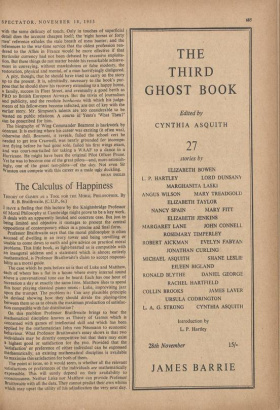The Calculus of Happiness
THEORY OF GAMES AS A TOOL FOR 11r1E. MORAL PHILOSOPHER. By R. B. Braithwaite. (C.U.P., 6s.) I HAVE a feeling that this lecture by the Knightsbridge Professor of Moral Philosophy at Cambridge might prove to be a key work. It deals with an apparently limited, and concrete case. But just in being limited and objective it manages to present the central coPpositions of contemporary ethics in a precise and final form.
Professor Braithwaite says that the moral philosopher is often accused of dwelling in an ivory tower and being unwilling or unable to come down to earth and give advice on practical moral Problems. This little book, as light-hearted as is compatible with an inaugural address and a statement which is almost entirely mathematical, is Professor Braithwaite's claim to accept responsi- bility as a moral guide.
The case which he puts before us is that of Luke and Matthew, each of whom has a flat in a house where every internal sound above a conversational tone can be heard. Each has one hour of recreation a day at exactly the same time. Matthew likes to spend this hour playing classical piano music : Luke, improvising jazz Upon the trumpet. The problem is: Can any plausible principle I be devised showing how they should divide the playing-time between them so as to obtain the maximum production of satisfac- tion compatible with fair distribution?
On this problem Professor Braithwaite brings to bear the mathematical discipline known as Theory of Games which is concerned with games of intellectual skill and which has been applied by the mathematician John von. Neumann to economic behaviour. What Professor Braithwaite's essay shows is that two individuals may he directly competitive but that there may exist a highest good or satisfaction for the two. Provided that the 'satisfaction' or preference of either individual can be expressed mathematically, an existing mathematical discipline is available to maximise this satisfaction for both of them.
The point at issue, so it would seem, is whether all the relevant satisfactions or preferences of the individuals are mathematically expressible. This will surely depend on their availability to consciousness. Neither Luke nor Matthew can provide Professor Braithwaite with all the data. They cannot predict their own whims Which may upset the utility of his adjudication the very next day. The life-sentence in the ivory tower to which many ethical philosophers feel themselves condemned was probably awarded 111 the last instance by the logical positivists. If ethics is meaningless and moral judgements are emotional noises, it is not much good coming down and acting the judge. This philosophical position, however, seems to be under review. Logical positivism was an answer to what was in effect an ultramontane claim of ethics to be a science. This claim has appeared in various disguises which can be put in a class as 'objectivism' and which range from Kant's Categorical Imperative to G. E. Moore's idea that 'good' is a property or quality which can be directly experienced. Utilitarians, as Professor Braithwaite suggests at one point, may be absurd in thinking that happiness can be calculated, but if you regard ethics as a science dealing with objective good in any form, calculation is the logical conclusion. Science still seems to be the lodestar, Recent ethical philosophers, including Professor Braithwaite, have been driven to conceive their problem in terms of economics and jurisprudence. They have the scales of justice in mind: and the desirable is what is in fact desired. But in order to retain calcula- tion, they give up talking about happiness.
However there are signs that we might be approaching the time when ethics, giving up the scientific illusion, claims its rights as psychological art. Meanwhile, respecting the economic view and fortifying ourselves with a strong dose of proverbs, we may saY 'happiness cannot be bought.' In other words, happiness not only has nothing to do with any calculation, so that, as we knew, the optimum production of tellies will not help : it often seems to be not even desirable, if by that we mean what is in practice desired. And yet onescannot help regarding happiness as the concern of ethics.
KATHLEEN NOTr











































































 Previous page
Previous page